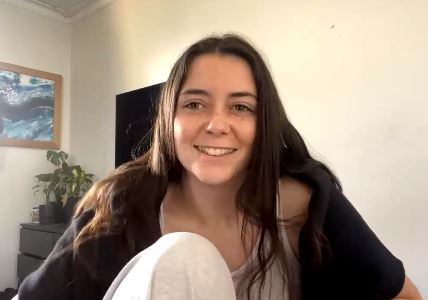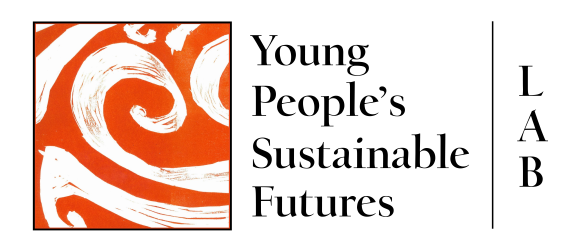
COVID-19 and Disadvantaged Young People’s Education and Employment Aspirations: A Longitudinal Study of Young People’s Transitions in Geelong.
The Young People’s Sustainable Futures Lab is delivering a 3 year project which provides Geelong region stakeholders with an evidence base to foster the education and employment aspirations of young people from disadvantaged backgrounds in the wake of a COVID-19 youth labour market crisis. This evidence is contributing to regional, state, national and international debates about the challenges and opportunities that emerge for young people’s education, training and employment pathways at the convergence of the 6th Mass Extinction and the 4th Industrial Revolution – the convergence ‘between an advanced knowledge economy, which perpetuates patterns of discrimination and exclusion, and the threat of climate change devastation for both human and non-human entities’ (Braidotti 2019).
One of the ways in which we are doing this is by conducting video interviews with a diverse group of young people in Geelong, including many young people who can be identified as marginalised, disengaged or living with historical disadvantage – although what this means, or what the consequences of this might be, cannot be assumed to be either uniform or known in advance.
In a series of three blogs we want to first tell a version of Daisy’s story, then Elijah’s (these stories have been co-produced with Daisy and Elijah). In the final blog, we will develop an analysis of what these stories provoke us to think about, and how the stories can make a productive contribution about the COVID-19 pandemic and the challenges for young people of ‘living well’ in the Anthropocene.
In 2021 Daisy was 20 years old and living in a shared flat in Bannockburn, a semi-rural area approximately 20 km from central Geelong. At that time she was working full-time at a school while completing her Certificate 3 in Education Support, and planned on attending university the following year.
In her video response Daisy on what she called her ‘struggles’ during the repeated, often lengthy public health lockdowns during 2020 and 2021:
I know for me personally, COVID has been really hard.
It’s been a real struggle coming in and out of lockdowns and then going into lockdown and having them extended.
And, you know, not seeing anyone, essentially which I feel like is really important – connecting to people.
For Daisy, the lockdowns affected her health and wellbeing, and were characterised by the loneliness that she imagines was felt by many, and which comes from feeling disconnected from others:
Not being able to connect to people or do the things that we used to be doing before all of this has been a really hard challenge for myself.
It helps our well-being, a lot for most people to be connected to one another.
I myself struggle with anxiety and depression, among other things, like many people, and it definitely has not been easy.
At the same time, Daisy felt fortunate and was grateful to be involved in sporting activities, and being able to continue with her employment – even though this was disrupted because of school closures.
I’m very lucky this year.
I guess in a way I know for where I live, sport was able to come back and that was a huge help for me this year, which was, last year, something that we didn’t have at all.
Being able to play netball again and get around the community and, you know, it was a huge help, despite the lockdowns in between that interrupted it.
I’m very lucky in the sense that I still have had my job, but it’s been very different to what it would normally look like working at a school and not being able to go to school is such a challenge for everyone, especially the kids.
In her work and study, and the connections this created for her to the impacts of many of the public health measures on children and young people’s health and well-being, Daisy spoke passionately about helping others struggling with anxiety and depression:
And I know for me personally, I’m really concerned about how this is going to impact kids and people in the future.
And there are many, many people who are battling with the same things that I am.
Some people, you know, are going through things that are worse than I am, and it’s really hard.
Daisy was not only reflective about how the COVID-19 pandemic affected her and others in Geelong, but also how the pandemic and other global crises affected the planet, particularly vulnerable populations in other countries.
There are so many people and countries struggling with many things in so many different ways, you know, and I feel like recently a lot of those are no longer spoken about.
Like, we have countries that still struggle with access to health care, or access to clean water or food or… we have climate change…and pollution is still a big issue, animal extinction and habitat loss.
And they’re still so important. And I feel like some people, with everything that’s going on with COVID at the moment, are no longer giving these a second thought which is really concerning.
In addition to these sorts of concerns, Daisy also worried about how the debates about the rollouts and mandating of the COVID-19 vaccine was, during this time, polarising communities:
We also have the vaccine, which I feel is dividing a lot of people on whether you should or shouldn’t be vaccinated, or if you’re not, what then comes from that, where you can go, where you can’t go.
I have seen people on both sides be really, really nasty about these sorts of things, and it’s really disheartening to see.
Because I feel like in a time like COVID, what the people need is to support one another despite what your personal beliefs are.
As she talked about and reflected on the ways in which the pandemic, and the public health crisis it produced, was evolving and being managed, Daisy responded to our question about how she imagined her future with some hope in terms of where she wanted to be living, and the sort of work she wanted to be doing five years into the future:
I want to be living maybe down by the coast or the country, the city’s not really for me. It’s too busy and there are too many people.
I hope to be working as a teacher, particularly working in well-being, and the well-being side of teaching.
Working with kids and also wellbeing are two things that I’m extremely passionate about.
Of particular importance to Daisy in the futures that she hoped for, was a focus on her own health and wellbeing, and her abilities to ‘grow’ and ‘persevere’ during challenging times:
I think it’s just really important to never forget to look after yourself and take care of yourself because it is extremely important.
I feel like this is something that a lot of people have learned over a time like this.
I hope in five years that I’m able to learn and grow from what it is that I’m facing at the moment and then you know, use that in order to motivate and shape the person that I hope to become.
Daisy’s focus on her own future wellbeing was balanced, as in most parts of her reflections, by her keen sense that the COVID crisis had provided an opportunity for herself and others to think about the importance of the connections that we are able to make with others, and the support that these connections can provide:
I think if going through all of this has taught us anything, it’s that, you know, in hard times we really need to focus on working together rather than against each other.
I hope that we can find a way to work together throughout all of this, and never forget what has happened.
I feel like this is a very big learning curve in how people treat each other.
Daisy’s sense of the importance of these interconnections and relationships, and the ‘lessons’ she and others might take from the pandemic, was expressed in the hopes that she held for the futures beyond COVID:
In five years, I hope people have been able to in a way move on and really work towards, you know, what it is that they want to achieve and that things get better for everyone.
And you know, we see some improvements within how the world is run and how we’re taking care of our planet.
We only have one, and it’s just super important to take care of the planet, but not only that but also take care of ourselves.
So, I hope five years in the future that’s exactly what I’ll be doing.
